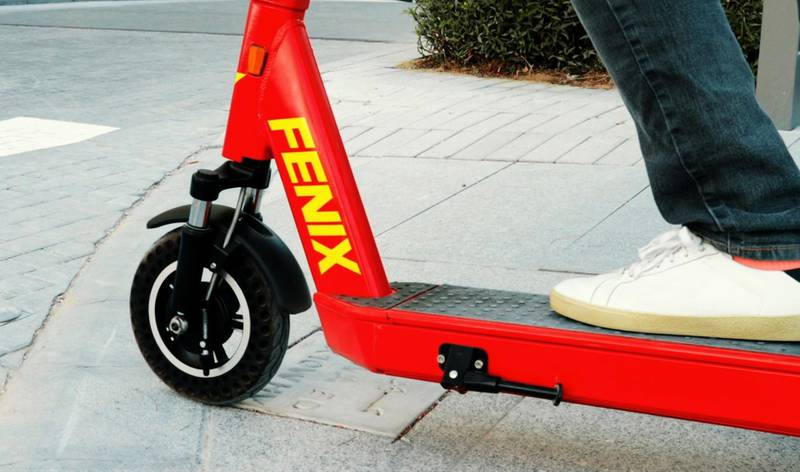The company, whose biggest investor is Israeli-based firm Maniv Mobility, has remained active in Qatar despite major public backlash. Doha News reached out to Aspire Zone for comment on this story but was not provided with one at time of publication.
Micro-mobility operator Fenix has entered into an exclusive partnership with Aspire Zone to launch its e-scooters in the area, despite the company previously causing a backlash in the Gulf state over its anti-Qatari Israeli investor.
The partnership is meant to offer visitors of Aspire Zone a means of mobility and transport to maneuver around the complex, providing designated spots in Aspire where the scooters will be available.
Fenix will also be introducing its shared e-bike at Aspire Zone, with plans on expanding the service to other areas in Qatar. With these expansions promised for the future, questions over its controversial funding and CEO have remained largely unanswered.
As reported by Doha News, Fenix’s operations in Qatar have received major backlash, mainly due to the fact that the company’s main investor is Israeli company Maniv Mobility. The scooter company received $3.8 million from the Israel-based venture capital firm in November of last year.
Fenix, based in the United Arab Emirates, was the first Emirati start-up to receive Israeli venture investment backing after Abu Dhabi normalised ties with the zionist state in September last year.
The company also operates in Bahrain, another country that followed the UAE’s footsteps in normalising ties with Israel. However, it is also operating in Qatar and Saudi Arabia—both of which have not established ties with Tel Aviv.
In December, the scooter company announced the launch of its operations in Qatar, with Co-Founder and CEO Jaideep Dhanoa confirming to Doha News at the time that this was facilitated by Qatar’s Ministry of Transport [MOTC].
It currently operates across West Bay, Onaiza, Legtaifiya, and Al Waab, and has recently expanded to Qatar Rail.
Israeli-funded Fenix scooters expand to Turkey following controversial Qatar launch
Apart from the company’s funding, Maniv’s CEO, Michael Granoff, who also sits on the board of Fenix, has a history of being fiercely anti-Qatar as well as making offensive comments about Palestinian.
In 2014, during the initial GCC crisis, and three years before an illegal land, air and sea blockade was imposed on Qatar, Granoff called for Doha to be embargoed.
On several occasions the Israeli businessman accused Qatar of supporting terrorism, even claiming that Doha “funds ISIS”, without providing any evidence for the claims.
But Granoff’s inflammatory comments are not limited to attacking Qatar. The staunch self-proclaimed zionist repeatedly uses the term “Palestinian terrorists” when referring to Palestinians.
In 2018, he even claimed that Ireland’s support for the United Nations’ Palestinian refugee programme was Dublin “paying terrorists”.
Another tweet from 2018 described unarmed Palestinian protesters in Gaza as “invading terrorists”. During those protests, more than 50 Palestinians, several of them children, were shot and killed by the Israeli army as they protested on the edge of the besieged strip.
With the company’s controversial nature, residents across Qatar have questioned why and how a company funded by a known Israeli investor was allowed to expand its operations into the country, especially considering Doha’s firm stance in support of the Palestinian cause.
As part of an investigation last year, Doha News spoke to Fenix’s CEO Jaideep Dhanoa to learn more about his main investor.
When asked if Fenix had sought Israeli investment for political reasons following the signing of the ‘Abraham Accords’, Dhanao said his company never intentionally targeted Israeli investors.
“As entrepreneurs we are looking for value adding investors…we never went looking for money from Israel, we were looking for the best investors that can support us,” the UAE based entrepreneur said at the time.
“We are not very political, I think there is a lot of opportunity for collaboration and it is more about isolation versus integration. They’re very different approaches. When there is integration, it fosters a better understanding,” Dhanoa added.
Ongoing Israeli occupation
Despite normalising with a number of Arab states last year, Israel has continued its violence against Palestinians, killing hundreds since signing the Abraham Accords.
This month, Israeli troops shot and killed a 13-year-old Palestinian boy as violence ensued east of the city of Nablus in the West Bank, where Palestinians launched a protest against settlement expansions.
The boy, Mohammad Da’das, was shot in the abdomen and died soon after being rushed to hospital.
According to Al Jazeera, citing the Palestinian Authority’s Ministry of Information, Israeli troops killed at least 3,000 Palestinian children over the past 20 years.
Meanwhile, Palestinian prisoners Miqdad Qawasmeh and Kayed al-Fasfous have been on hunger strike for 117 and 124 days respectively as they protest their detention without charge or trial.
Earlier this year, local calls for boycott resurfaced during an 11-day Israeli bombardment on Gaza in which at least 256 Palestinians were killed, including 66 children.
Since the deadly May offensive, Qatari authorities have issued several statements to denounce Israeli violence against Palestinians, confirming the Gulf state has no plans to normalise with Tel Aviv.
Follow Doha News on Twitter, Instagram, Facebook and Youtube
